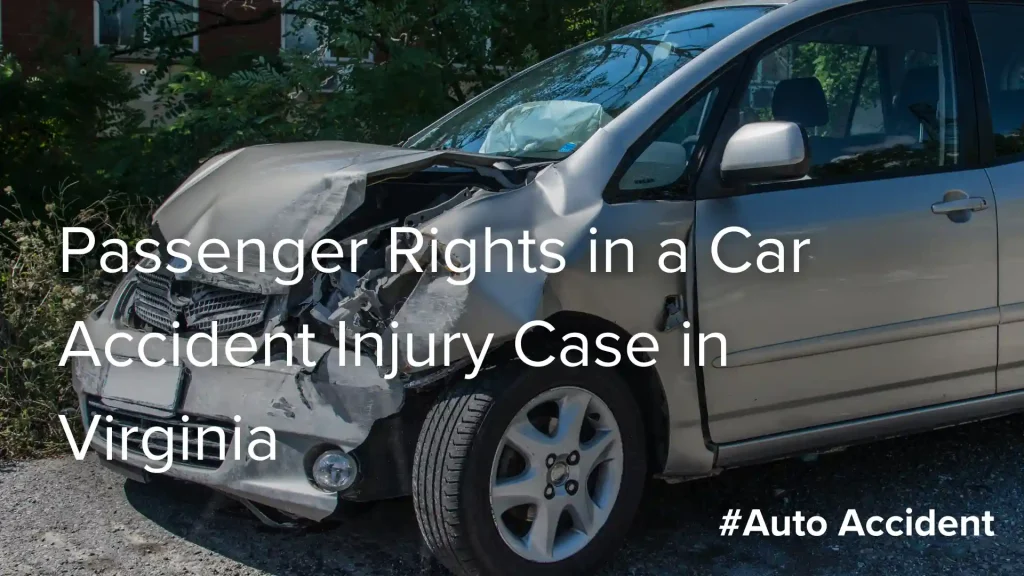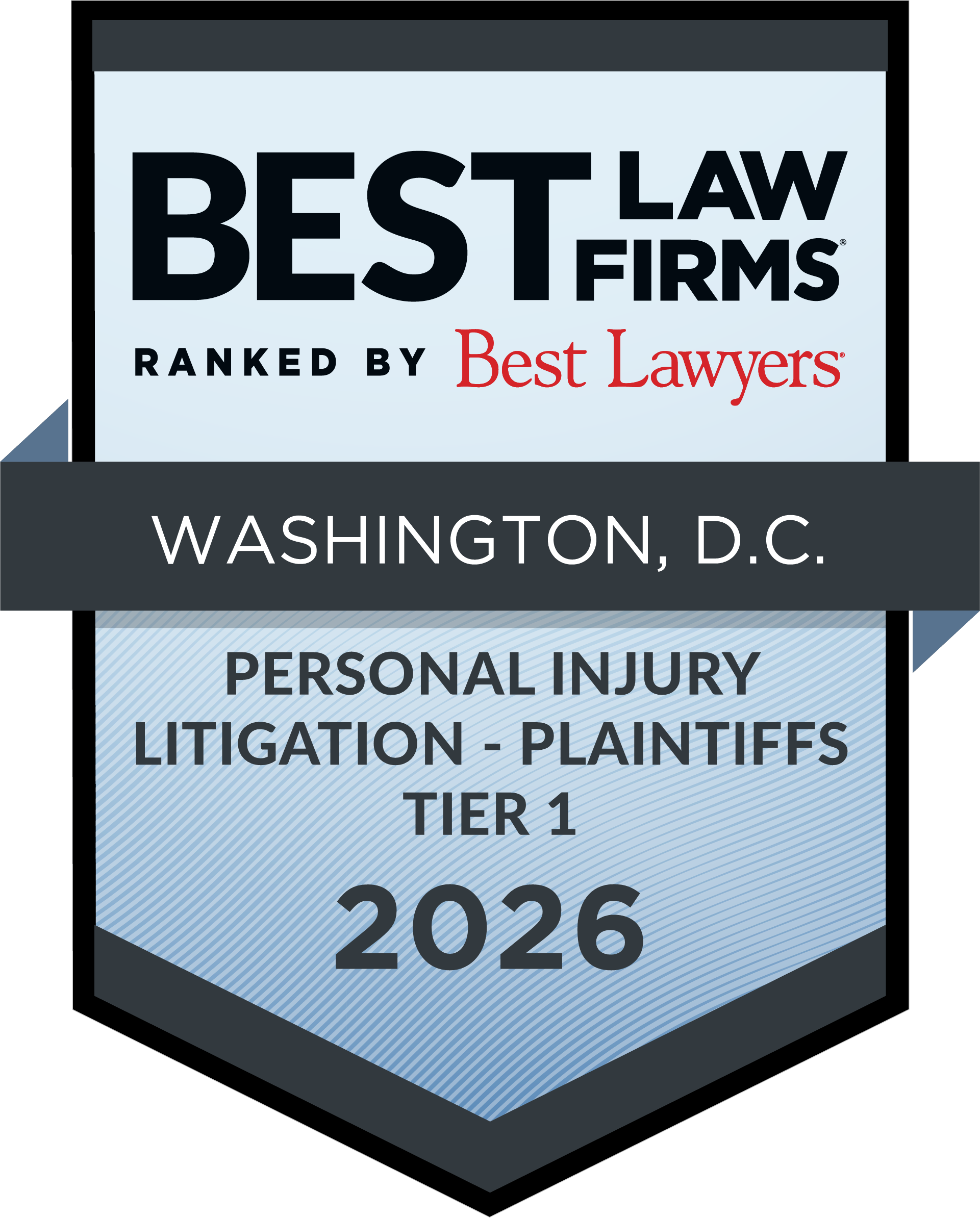Nov 04, 2025 | Bradley SEO
Your status as a passenger creates a unique legal position. You stand outside the negligence that caused the accident. This allows you to pursue claims against any at-fault party without the complications that drivers face. Contact CHASENBOSCOLO today to discuss your passenger injury claim with our experienced legal team.
Do You Have Rights as a Passenger in a Car Accident?
Yes. Virginia law provides distinct legal protections for passengers injured in car accidents. However, your recovery rights depend on whether you paid for your ride.
Paying Passengers: Under Virginia Code § 8.01-63, paying passengers can pursue compensation for injuries sustained in a motor vehicle accident based on ordinary negligence, regardless of who caused the collision. CHASENBOSCOLO‘s Virginia car accident lawyers understand these distinctions and fight for your full recovery.
Non-Paying Passengers (Guests): Non-paying passengers must prove the driver engaged in “gross negligence or willful and wanton disregard” for safety—a significantly higher legal standard than ordinary negligence. However, if the driver was intoxicated or committed an unlawful act, the ordinary negligence standard applies to non-paying passengers as well.
Unlike drivers, passengers bear no responsibility for the accident itself. This fundamental distinction means paying passengers can recover damages even if the driver of your vehicle was partially or entirely at fault. Virginia operates as a pure at-fault (tort-based) insurance state, meaning the at-fault driver’s insurance is responsible for damages. Passengers can pursue claims against the at-fault driver’s liability insurance or file a lawsuit directly.
How CHASENBOSCOLO Can Help
CHASENBOSCOLO represents injured passengers throughout Virginia. Our Fairfax office serves Northern Virginia residents with personal injury attorneys who understand passenger injury claims.
Our firm has recovered over $750 million for injured clients since 1986. Our attorneys hold multiple Super Lawyers and AV ratings, recognizing their legal proficiency. View our attorney profiles to learn about the experienced lawyers handling your case.
We handle passenger injury cases on a contingency fee basis, meaning you pay no upfront costs. We recover fees only if we secure compensation for you. Our team provides 24/7 client availability to ensure you receive support when you need it.
Who Can You Sue After a Passenger Injury?
The At-Fault Driver
You can sue the driver of the vehicle you were in if that driver’s negligence caused or contributed to the accident. Negligence occurs when a driver fails to exercise reasonable care. Examples include distracted driving, speeding, or reckless behavior.
You also retain the right to sue other drivers involved in the collision. If another vehicle struck the car you were in, you can pursue a claim against that driver’s insurance or file a lawsuit directly. Our Virginia auto accident attorneys have extensive experience pursuing claims against multiple at-fault parties.
Other Liable Parties
Beyond drivers, multiple parties may bear liability for your injuries. Employers may be responsible if the at-fault driver was working at the time of the accident. Rideshare companies like Uber and Lyft carry commercial insurance that covers passenger injuries under certain circumstances. Third parties whose negligence contributed to the accident—such as a vehicle manufacturer if a defect caused the collision—may also face liability.
Your attorney can identify all potential sources of compensation. This approach maximizes your recovery. Learn more about our case results in complex multi-party cases.
What Compensation Can You Recover?
Economic damages compensate you for quantifiable financial losses. Medical expenses form the foundation of most passenger injury claims. These cover emergency room treatment, surgery, hospitalization, rehabilitation, and ongoing medical care. Lost wages account for income you missed during recovery and any reduction in earning capacity from permanent injuries.
Property damage claims cover personal belongings damaged in the accident. Transportation costs during your recovery period also qualify as recoverable damages. These include rideshare services, rental cars, or public transportation. Understanding your compensation options is critical to maximizing your recovery.
Non-Economic Damages
Non-economic damages address the subjective impact of your injuries. Pain and suffering compensation reflects the physical discomfort and emotional trauma you experienced. Courts recognize that serious injuries cause lasting psychological effects, including anxiety, depression, and post-traumatic stress.
Loss of enjoyment of life acknowledges that injuries may prevent you from participating in activities you previously enjoyed. Disfigurement or scarring, particularly visible injuries, warrant separate compensation. This compensation addresses the emotional and social impact beyond medical treatment. Our attorneys have recovered substantial awards for pain and suffering damages.
Punitive Damages
In cases involving gross negligence or reckless conduct, Virginia law permits punitive damages. These damages are designed to punish the defendant and deter similar future misconduct. These damages exceed compensation for actual losses and apply only in egregious circumstances, such as driving under the influence or extreme speeding. Under Virginia Code § 8.01-34, punitive damages require clear and convincing evidence of wrongdoing.
Understanding Virginia’s Contributory Negligence Rule
Virginia applies a strict contributory negligence standard: any negligence on your part bars recovery entirely. However, this rule rarely affects passengers. Courts recognize that passengers typically cannot control the vehicle or prevent accidents.
Contributory negligence might apply if you actively interfered with the driver. For example, grabbing the steering wheel would constitute interference. However, Virginia law prohibits using seatbelt non-compliance against you in civil cases. This effectively eliminates this potential defense.
Your attorney protects your interests by establishing that your actions did not contribute to the accident. This preserves your full recovery rights. Our legal team specializes in defending passenger rights under Virginia’s strict negligence standards and has recovered over $750 million for injured clients.
Insurance Coverage for Injured Passengers
The driver’s auto insurance policy provides the first source of recovery. Medical payments coverage pays your medical expenses regardless of fault. Uninsured or underinsured motorist coverage applies if the at-fault driver lacks sufficient insurance. Understanding insurance coverage options helps you identify all available compensation sources.
Your Own Auto Insurance
Your personal auto insurance policy may provide coverage even though you were a passenger. Your medical payments coverage and uninsured/underinsured motorist protection extend to passenger injuries you sustain. Many passengers don’t realize they have multiple insurance sources available to them.
Rideshare Insurance
Uber and Lyft maintain commercial insurance policies covering passenger injuries. Coverage depends on the app’s status when the accident occurred. If you were actively using the app with a passenger in the vehicle, commercial coverage applies. If the driver was offline or waiting for a ride request, personal auto insurance may apply instead. Learn more about rideshare accident claims and your coverage options.
Virginia’s Statute of Limitations for Passenger Injury Claims
Virginia law provides a two-year statute of limitations from the accident date to file a lawsuit. This deadline applies whether you pursue a claim through insurance or file a civil action in court. Under Virginia Code § 8.01-246, this timeline is strictly enforced.
Acting quickly preserves evidence and witness testimony. Memories fade, physical evidence deteriorates, and witnesses become difficult to locate as time passes. Consulting an attorney promptly ensures your claim receives proper attention and protection. Don’t wait—call CHASENBOSCOLO at (301) 220-0050 today for a free consultation.
Steps to Take After a Passenger Injury
Seek medical attention immediately, even if injuries seem minor. Some injuries manifest hours or days after an accident. Medical documentation creates the foundation for your claim and establishes the causal connection between the accident and your injuries.
Report the accident to police and obtain a copy of the accident report. Document the scene with photographs showing vehicle damage, road conditions, and traffic signals. Collect contact information from witnesses and the other driver.
Notify the driver’s insurance company and your own insurer of the accident. Provide factual information without admitting fault or speculating about liability. Read our guide on reporting accidents for more details on protecting your claim.
Legal Actions
Contact an attorney as soon as possible. Your attorney handles communication with insurance companies, preserves evidence, and protects your rights throughout the claims process. CHASENBOSCOLO‘s personal injury attorneys are available 24/7 to discuss your case.
Maintain all medical records, bills, and documentation related to your injuries and treatment. Avoid discussing the accident or your injuries on social media. Insurance companies monitor social media activity. Learn why social media can hurt your case.
Follow your medical provider’s treatment recommendations completely. Gaps in medical treatment weaken your claim by suggesting your injuries were less serious than claimed.
Frequently Asked Questions
Can a passenger sue the driver if they were friends?
Yes. Passenger status overrides personal relationships. Virginia law protects passengers regardless of their relationship to the driver. Friendship or family connection does not prevent you from pursuing a legitimate injury claim. Our attorneys have successfully represented passengers in cases involving friends and family members.
What if the passenger was partially at fault?
Virginia’s strict contributory negligence rule means any negligence on your part bars recovery. However, passengers are rarely found at fault unless they actively interfered with the driver or vehicle. Your attorney establishes that your actions did not contribute to the accident. Contact us to discuss your specific situation.
How long does a passenger injury claim take?
Timeline varies based on injury severity and liability complexity. Simple claims with clear liability may resolve in months through insurance settlement. Complex cases involving multiple parties or serious injuries may take one to two years or longer to resolve through litigation. View our case results to see examples of cases we’ve handled.
Do I need an attorney for a passenger injury claim?
While not required, an attorney significantly increases settlement value and protects your rights throughout the process. Insurance companies often offer lower settlements to unrepresented claimants. An attorney negotiates aggressively and pursues litigation if necessary to secure fair compensation. Our experienced team is ready to help.
What if the driver doesn’t have insurance?
Your own uninsured motorist coverage applies if you carry this protection. The host driver’s underinsured motorist coverage may also apply. An attorney identifies all available coverage sources and pursues every avenue for compensation.








